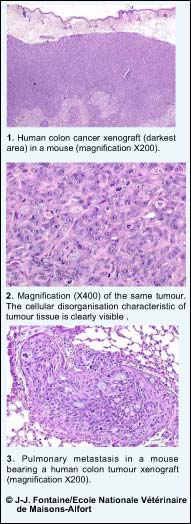Colorectal cancer : A new way of increasing the efficacy of chemotherapy

Inserm and CNRS research scientists and doctors at the Institut Curie have demonstrated the influence of the status – mutated or functional – of the tumour suppressor gene p53 in the response of colorectal cancer to chemotherapy. Tumours in which the p53 gene is mutated respond less well to treatment. However, by adding another agent, researchers at the Institut Curie have succeeded in increasing the efficacy of chemotherapy in mice bearing human cancer xenografts.
The presence of a mutation in the p53 gene could explain the resistance to treatment of certain tumours, whence interest in developing therapeutic approaches better suited to the genetic profiles of tumours.
These results were published the 4 march 2004 issue of Oncogene.
Cancer results from the accumulation of genetic errors in a given cell. These alterations, which are specific to each cancer, could be an indicator of the cancer’s capacity to develop but also of its response to different treatments.
Colorectal cancer is the second cause of mortality in the Western world. If detected early enough, the tumour can be removed surgically. In the advanced forms of colorectal cancer, chemotherapy is prescribed. This chemotherapy comprises a combination of three agents: 5-fluorouracil (5-FU), leucovorin and, depending on the case, irinotecan (CPT-11) or oxaliplatin.
Mutations and response to treatment
A mutation in tumour suppressor gene p53 (see box below) is found in close to 70% of cancers of the colon.
The p53 gene is the guardian of genome integrity, and participates in the response to genetic alterations, and notably in the response to damage to DNA induced by chemotherapy drugs. Consequently, the status – mutated or functional – of the p53 gene influences the response to chemotherapy.
Research scientists and doctors of the Institut Curie have investigated the response to irinotecan (CPT-11), a drug which induces breaks in the DNA of tumour cells. Through this collaboration, they have shown that when the p53 gene is functional, CPT-11 is effective: the proliferation of tumour cells is reduced, both in vitro and in vivo. In contrast, when the gene p53 is mutated, CPT-11 is less effective.
A promising synergy in thwarting mutations of the p53 gene
Using their cell and animal model, the Institut Curie researchers can study secondary events occurring a few hours after administration of chemotherapy and hence understand better, or even find solutions to, the resistance to treatments observed in certain cases.
By analysing the mechanisms induced by CPT-11, the Institut Curie researchers have demonstrated an abnormal accumulation of a particular protein in the cells where the p53 gene is mutated. This accumulation could play a determinant role in resistance to chemotherapy. To foil the effects of this accumulation, the scientists tested the effect of an inhibitor of this protein, CYC-202, which is currently undergoing clinical development for several cancers in the Clinical Research Unit(5) at the Institut Curie.
The teams of Marie-France Poupon, Sylvie Robine and Patricia de Cremoux show that in tumours where the p53 gene is mutated, chemotherapy with a combination of the two agents (CPT-11 and CYC-202) is more effective than chemotherapy with CPT-11 alone. This synergy is very encouraging for the treatment of advanced stages of the disease in which the p53 gene is often mutated.
If the specific alterations of the tumour of an individual are known, this may enable better targeted and more personalised and effective treatments to be developed.
The idea is to pursue the development of novel therapeutic strategies based on in-depth knowledge of the cellular effects induced by chemotherapy. The availability of suitable new chemical agents will enable this aim to be achieved.
Reference
Enhanced Sensitivity to Irinotecan by Cdk1 Inhibition in the p53-deficient HT29 Human Colon Cancer Cell Line
Oncogene, vol.23, 4 march 2004.
Miguel Abal1, Rui Bras-Goncalves2, Jean-Gabriel Judde2, Hafida Fsihi3, Patricia de Cremoux4, Daniel Louvard3, Henri Magdelenat1, Sylvie Robine3 and Marie-France Poupon2
1 Laboratoire de transfert, équipe « Morphogenèse et signalisation cellulaires » UMR 144 CNRS/Institut Curie, Paris
2 Altérations métaboliques et thérapie, UMR 147, Institut Curie-CNRS
3 Morphogenèse et signalisation cellulaires, UMR 144, Institut Curie-CNRS
4 Département de Biologie des tumours, Institut Curie
Media Contact
All latest news from the category: Health and Medicine
This subject area encompasses research and studies in the field of human medicine.
Among the wide-ranging list of topics covered here are anesthesiology, anatomy, surgery, human genetics, hygiene and environmental medicine, internal medicine, neurology, pharmacology, physiology, urology and dental medicine.
Newest articles

First-of-its-kind study uses remote sensing to monitor plastic debris in rivers and lakes
Remote sensing creates a cost-effective solution to monitoring plastic pollution. A first-of-its-kind study from researchers at the University of Minnesota Twin Cities shows how remote sensing can help monitor and…

Laser-based artificial neuron mimics nerve cell functions at lightning speed
With a processing speed a billion times faster than nature, chip-based laser neuron could help advance AI tasks such as pattern recognition and sequence prediction. Researchers have developed a laser-based…

Optimising the processing of plastic waste
Just one look in the yellow bin reveals a colourful jumble of different types of plastic. However, the purer and more uniform plastic waste is, the easier it is to…



